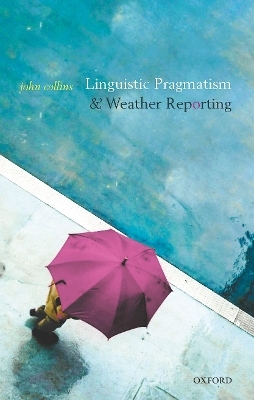
Linguistic Pragmatism and Weather Reporting
Seiten
2020
Oxford University Press (Verlag)
978-0-19-885113-4 (ISBN)
Oxford University Press (Verlag)
978-0-19-885113-4 (ISBN)
John Collins defends the doctrine of linguistic pragmatism--arguing that linguistic meaning alone fails to fix truth conditions and detailing the relative sparseness of what language alone can provide to semantic interpretation--through his novel analysis of the syntax, semantics, and pragmatics of weather reporting.
Linguistic pragmatism claims that what we literally say goes characteristically beyond what the linguistic properties themselves mandate. In this book, John Collins provides a novel defence of this doctrine, arguing that linguistic meaning alone fails to fix truth conditions. While this position is supported by a range of theorists, Collins shows that it naturally follows from a syntactic thesis concerning the relative sparseness of what language alone can provide to semantic interpretation. Language-and by extension meaning-provides constraints upon what a speaker can literally say, but does not characteristically encode any definite thing to say. Collins then defends this doctrine against a range of alternatives and objections, focusing in particular on an analysis of weather reports: 'it is raining/snowing/sunny'. Such reporting is mostly location-sensitive in the sense that the utterance is true or not depending upon whether it is raining/snowing/sunny at the location of the utterance, rather than some other location. Collins offers a full analysis of the syntax, semantics, and pragmatics of weather reports, including many novel data. He shows that the constructions lack the linguistic resources to support the common literal locative readings. Other related phenomena are discussed such as the Saxon genitive, colour predication, quantifier domain restriction, and object deletion.
Linguistic pragmatism claims that what we literally say goes characteristically beyond what the linguistic properties themselves mandate. In this book, John Collins provides a novel defence of this doctrine, arguing that linguistic meaning alone fails to fix truth conditions. While this position is supported by a range of theorists, Collins shows that it naturally follows from a syntactic thesis concerning the relative sparseness of what language alone can provide to semantic interpretation. Language-and by extension meaning-provides constraints upon what a speaker can literally say, but does not characteristically encode any definite thing to say. Collins then defends this doctrine against a range of alternatives and objections, focusing in particular on an analysis of weather reports: 'it is raining/snowing/sunny'. Such reporting is mostly location-sensitive in the sense that the utterance is true or not depending upon whether it is raining/snowing/sunny at the location of the utterance, rather than some other location. Collins offers a full analysis of the syntax, semantics, and pragmatics of weather reports, including many novel data. He shows that the constructions lack the linguistic resources to support the common literal locative readings. Other related phenomena are discussed such as the Saxon genitive, colour predication, quantifier domain restriction, and object deletion.
John Collins is Professor of Philosophy at the University of East Anglia. He mainly researches in the areas of philosophy of language and linguistic theory, but has written more broadly on the concept of truth and issues in philosophy of science and philosophy of mind. He is the author of many articles and two books, Chomsky: A Guide for the Perplexed (Bloomsbury 2008) and The Unity of Linguistic Meaning (Oxford 2011).
1: Linguistic Pragmatism
2: Squaring Pragmatism with Linguistic Meaning
3: When the Weatherman Says 'It's Raining'
4: The Linguistic Properties of Weather Reports
5: Quantificational Weather Reports
6: Variadic Functions and the Significance of Complement Deletion
| Erscheinungsdatum | 27.05.2020 |
|---|---|
| Verlagsort | Oxford |
| Sprache | englisch |
| Maße | 141 x 224 mm |
| Gewicht | 410 g |
| Themenwelt | Geisteswissenschaften ► Philosophie ► Sprachphilosophie |
| Geisteswissenschaften ► Sprach- / Literaturwissenschaft ► Sprachwissenschaft | |
| ISBN-10 | 0-19-885113-8 / 0198851138 |
| ISBN-13 | 978-0-19-885113-4 / 9780198851134 |
| Zustand | Neuware |
| Informationen gemäß Produktsicherheitsverordnung (GPSR) | |
| Haben Sie eine Frage zum Produkt? |
Mehr entdecken
aus dem Bereich
aus dem Bereich
Wie die Menschheit zu ihrer größten Erfindung kam
Buch | Softcover (2022)
C.H.Beck (Verlag)
18,00 €
Macht und Legitimität politischer Sprache im Prozess der europäischen …
Buch | Softcover (2023)
Nomos (Verlag)
74,00 €


